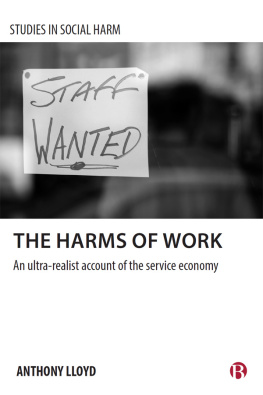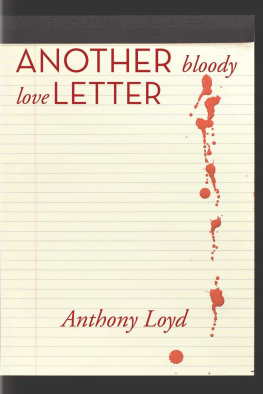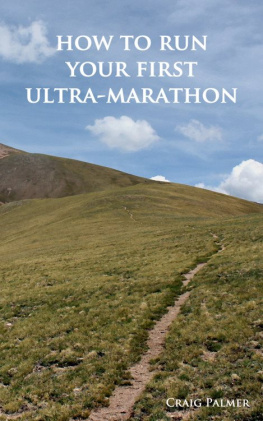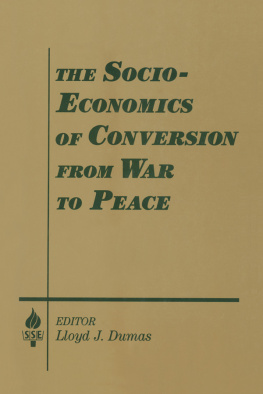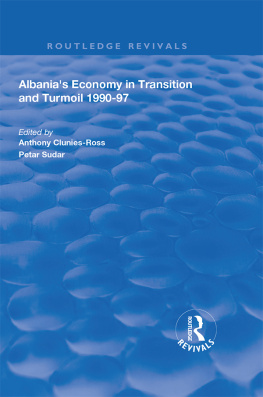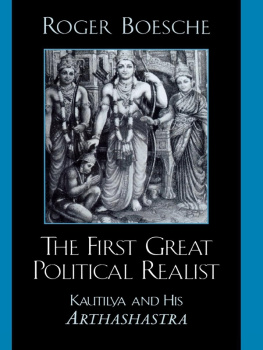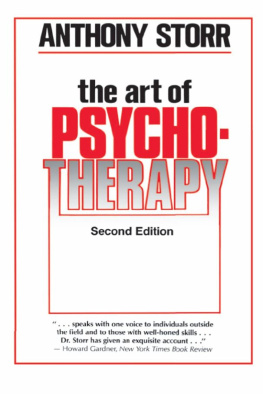THE HARMS OF WORKStudies in Social Harm
Series editors: Christina Pantazis, University of Bristol, UK
Simon Pemberton, University of Birmingham, UK
Steve Tombs, The Open University, UK
Environmental harm: An eco-justice perspective
by Rob White (2013)
Harmful societies: Understanding social harm
by Simon Pemberton (2015)
Labour exploitation and work-based harm
by Sam Scott (2017)
A sociology of harm
by Lynne Copson (2019)
Global kitchens and super highways: Social harm and the
political economy of food
by Reece Walters (2019)
Pharmaceuticals and social harm
by Sarah Payne (2019)
Deviant leisure and social harm
by Oliver Smith and Thomas Raymen (2019)
New perspectives on Islamophobia and social harm
by Chris Allen (2020)
See more at
https://policy.bristoluniversitypress.co.uk/studies-in-social-harm
THE HARMS OF WORK
An ultra-realist account of the service economy
Anthony Lloyd
First published in Great Britain in 2018 by
Bristol University Press 1-9 Old Park Hill Bristol BS2 8BB UK Tel +44 (0)117 954 5940 e-mail
North American office: Policy Press c/o The University of Chicago Press 1427 East 60th Street Chicago, IL 60637, USA t: +1 773 702 7700 f: +1 773-702-9756 e:
Bristol University Press 2018
British Library Cataloguing in Publication Data
A catalogue record for this book is available from the British Library
Library of Congress Cataloging-in-Publication Data
A catalog record for this book has been requested
ISBN 978-1-5292-0401-8 hardcover
ISBN 978-1-5292-0404-9 ePub
ISBN 978-1-5292-0405-6 Mobi
ISBN 978-1-5292-0402-5 ePDF
The right of Anthony Lloyd to be identified as author of this work has been asserted by him in accordance with the Copyright, Designs and Patents Act 1988.
All rights reserved: no part of this publication may be reproduced, stored in a retrieval system, or transmitted in any form or by any means, electronic, mechanical, photocopying, recording, or otherwise without the prior permission of Bristol University Press.
The statements and opinions contained within this publication are solely those of the author and not of the University of Bristol or Bristol University Press. The University of Bristol and Bristol University Press disclaim responsibility for any injury to persons or property resulting from any material published in this publication.
Bristol University Press works to counter discrimination on grounds of gender, race, disability, age and sexuality.
Cover design and image by Bristol University Press
Front cover image: Getty
Readers Guide
This book has been optimised for PDA.
Tables may have been presented to accommodate this devices limitations.
Image presentation is limited by this devices limitations.
Contents
About the author
Anthony Lloyd is Senior Lecturer in Criminology and Sociology at Teesside University. His research has investigated reconfigured labour markets under neoliberal global capital and has thus far focused on call centres and the service economy. The connection between the workplace, subjectivity and the fields of critical criminology and social harm form the basis for his current research. His first research monograph, Labour Markets and Identity on the Post-Industrial Assembly Line was published in 2013 by Ashgate.
Acknowledgements
In writing this book, I have again recognised the truth that books may contain a single authors name but are in fact the result of a much wider number of influences. Colleagues at Teesside University and within the Teesside Centre for Realist Criminology deserve special mention for their support, advice and discussions over the years. Avi Boukli and Justin Kotz invited me to contribute a chapter to their edited collection Zemiology: Reconnecting Crime and Social Harm that forced me to think carefully about the connections between social harm and the workplace so I thank them for that. Jo Large, Alex Hall, Mark Horsley, Louise Wattis, Victoria Bell, Pauline Ramshaw, Rob MacDonald, Georgios Papanicolaou and Georgios Antonopoulos have provided ideas, inspiration and support for which I am extremely grateful. Colleagues beyond Teesside University are too numerous to mention but your work and determination to make sense of what is going on in our communities continuously motivates me to be better at what I do.
My largest academic debt is reserved for Simon Winlow, Steve Hall and Philip Whitehead. Their impact upon my personal, professional and intellectual development is immeasurable and their support has been unwavering. Their contribution to this book through discussion of ideas, moral support, and generously reading through proposals or drafts has helped shape my thinking and writing considerably and has never been taken for granted or gone unnoticed. Of course, the errors are my own.
A big thank-you must go to everyone who gave up their time to speak with me. Their words provide the heart and emotional context to my academic argument and without them this book would be impossible. I sincerely wish the best for each of you in the future. I would also like to thank Bristol University Press and the Studies in Social Harm series for providing this work with a home. The support and advice from Rebecca Tomlinson, Victoria Pittman and Laura Greaves have been particularly important and appreciated.
Finally, Nietzsche said if you wish to strive for peace of soul and happiness, then believe; if you wish to be a disciple of truth, then inquire. In my commitment to inquiry I incur considerable debts to my family who put up with a lot. My love and thanks go to Gabriel, Elizabeth and Briony for taking me on and to my Joey for everything.
Foreword
The book series Studies in Social Harm seeks to advance the disciplinary agenda of zemiology by encouraging innovative approaches that can produce accurate and systematic analyses of injury in late capitalist societies. It encourages theoretical and methodological approaches that seek to build a more sophisticated picture of the lived reality of injury, focusing for example on the interrelated nature of harm, its social patterning, and how harms accumulate across the life course from the cradle to the grave. One of the principal motivations driving this work is to foreground structural harms within social science analysis, to understand the varied ways that the organisation of societies serves to injuriously compromise human flourishing.
In this, the latest contribution to the series, a further aspect of harm production in contemporary capitalist societies is explored, this time in relation to the shifting nature of the labour market. Over the last 65 years, the UK like many wealthy industrialised nations has seen a marked shift from the manufacturing to the services sector. In the UK, this has been more dramatic than many G7 countries with the service industry now constituting approximately 80% of economic output, with more than four of every five UK jobs being an occupation with a service focus. The sector provides goods and services that have an impact on many aspects of our lives ranging from our financial security, health and well-being through to leisure and consumption. However, following the Sports Direct and Amazon scandals in 2016, which revealed workers to be employed on zero-hour contracts, paid under the minimum wage, undertaking 55-hour working weeks and working under severe surveillance and disciplinary regimens, the sector came to be questioned in political and policy debates. Indeed the very practices that appear to ensure savings and convenience demanded by the consumer (as well as the profits required by the shareholders), inflict untold injury on the workers in this sector.


